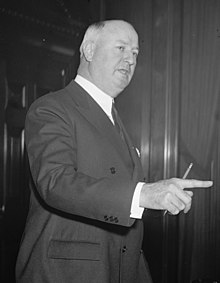
Back جيمس فارلي Arabic Ceyms Aloizius Farli Azerbaijani جیمز فارلی AZB James Farley German James Farley Finnish James Aloysius Farley French ג'יימס פארלי HE James Farley NB Фарли, Джеймс Алоизиус Russian 吉姆·法利 Chinese
James Farley | |
|---|---|
 | |
| 53rd United States Postmaster General | |
| In office March 4, 1933 – September 10, 1940 | |
| President | Franklin D. Roosevelt |
| Preceded by | Walter Folger Brown |
| Succeeded by | Frank C. Walker |
| Chair of the Democratic National Committee | |
| In office July 2, 1932 – August 17, 1940 | |
| Preceded by | John J. Raskob |
| Succeeded by | Edward J. Flynn |
| Chair of the New York Democratic Party | |
| In office October 1930 – June 1944 | |
| Preceded by | M. William Bray |
| Succeeded by | Paul Fitzpatrick |
| Member of the New York Assembly from Rockland County | |
| In office January 1, 1923 – December 31, 1923 | |
| Preceded by | Pierre DePew |
| Succeeded by | Walter Gedney |
| Personal details | |
| Born | James Aloysius Farley May 30, 1888 Grassy Point, New York, U.S. |
| Died | June 9, 1976 (aged 88) New York City, U.S. |
| Resting place | Gate of Heaven Cemetery |
| Political party | Democratic |
| Spouse |
Elizabeth Finnegan
(m. 1920; died 1955) |
| Children | 3 |
| Education | Packard Business College |
James Aloysius Farley (May 30, 1888 – June 9, 1976) was an American politician who simultaneously served as chairman of the New York State Democratic Committee, chairman of the Democratic National Committee, and Postmaster General under President Franklin Roosevelt, whose gubernatorial and presidential campaigns were run by Farley.
Farley was commonly referred to as a political kingmaker, as he was responsible for Roosevelt's rise to the presidency.[1] He was the campaign manager for New York State politician Alfred E. Smith's 1922 gubernatorial campaign and Roosevelt's 1928 and 1930 gubernatorial campaigns as well as Roosevelt's presidential campaigns of 1932 and 1936. Farley predicted large landslides in both, and revolutionized the use of polling data. He was also a business executive and dignitary.
Farley was responsible for pulling together the New Deal Coalition of Catholics, labor unions, African Americans, and farmers. Both he and the administration's patronage machine over which he presided helped to fuel the social and infrastructure programs of the New Deal. He handled most mid-level and lower-level appointments, in consultation with state and local Democratic organizations.[2] He opposed Roosevelt for breaking the two-term tradition of the presidency; the two broke on that issue in 1940. As of 1942, Farley was considered the supreme Democratic Party boss of New York.[3]
As dignitary, Farley helped to normalize diplomatic relations with the Holy See, and in 1933 he was the first high-ranking government official to travel to Rome, where he had an audience with Pope Pius XI and dinner with Cardinal Pacelli (future Pope Pius XII).[4] In business, Farley guided and remained at the helm of Coca-Cola International as chairman for over 30 years, and was responsible for the company's global expansion as a quasi-government agency in World War II. Coca-Cola ("Coke"), shipped with food and ammunition as a "war priority item", was used as a boost to the morale and energy levels of the fighting men, in a deal that spread Coke's market worldwide at government expense. Also at US expense, after the war, 59 new Coke plants were installed to help rebuild Europe.[citation needed]
In 1947, President Harry S. Truman appointed Farley to serve a senior post as a commissioner on the Hoover Commission, also known as the Commission on Organization of the Executive Branch of the Government. The landmark James A. Farley Building in New York City is designated in his honor and as a monument to his career in public service.[5]
- ^ Farley Dies – Jun 10, 1976 – NBC – TV news: Vanderbilt Television News Archive. Tvnews.vanderbilt.edu (June 10, 1976). Retrieved on July 26, 2013.
- ^ Daniel Mark Scroop, Mr. Democrat: Jim Farley, the New Deal and the Making of Modern American Politics (University of Michigan Press, 2006)
- ^ "The Nation: Farley Wins". Time. August 31, 1942. Retrieved January 31, 2021.
- ^ Full text of "Jim Farley S Story". Archive.org. Retrieved on July 26, 2013.
- ^ Bill Summary & Status – 97th Congress (1981 – 1982) - H.RES.368 – THOMAS (Library of Congress) Archived April 15, 2012, at WebCite. Thomas.loc.gov. Retrieved on July 26, 2013.
© MMXXIII Rich X Search. We shall prevail. All rights reserved. Rich X Search